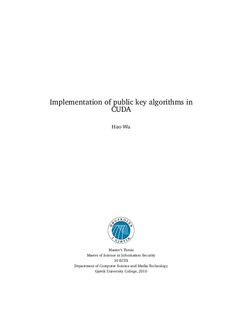Implementation of public key algorithms in CUDA
Master thesis
Permanent lenke
http://hdl.handle.net/11250/143934Utgivelsesdato
2010Metadata
Vis full innførselSamlinger
Sammendrag
In the field of cryptography, public key algorithms are widely known to be slower than
symmetric key alternatives for the reason of their basis in modular arithmetic. The modular
arithmetic in e.g. RSA and Diffie Hellman is computationally heavy when compared
to symmetric algorithms relying on simple operations like shifting of bits and XOR. Therefore,
how to make a more efficient and faster implementation of public key algorithms
is publicly concerned.
With the development of the GPGPU (General-purpose computing on graphics processing
units) field, more and more computing problems are solved by using the parallel
property of GPU (Graphics Processing Unit). CUDA (Compute Unified Device Architecture)
is a framework which makes the GPGPU more accessible and easier to learn for
the general population of programmers. This is because it builds on C and hides many of
the complicated details of how the GPU works from a CUDA developer. Using the unique
properties of the GPU through CUDA has greatly increased the efficiency of many computational
problems. Multiplication of big integers is one of the building blocks in doing
modular arithmetic. Running the public key algorithms by use of the parallel properties
of the GPU in modular multiplication and modular exponentiation may be a solution to
this problem.
The target in this research is to study and analyse the majority of algorithms related
to the modular multiplication and modular exponentiation, and then to design and make
an implementation of a public key algorithm in CUDA. Finally, this project will compare
the performance between the GPU implementation and the CPU implementation in order
to look into the possibility of improving the performance of public key algorithms. The
research questions are divided into four groups, the first one regarding modular multiplication
and modular exponentiation of big integers and their parallelism, the second
one about integrating parallel modular multiplication and modular exponentiation into
the public key algorithm, the third one concerning optimization of the algorithm, and
final one regarding performance comparison of public key algorithm between the GPU
implementation and the CPU implementation.
